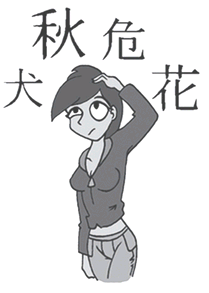Matt Fargo (4 page)
Authors: Dirty Japanese: Everyday Slang From "What's Up?" to "F*%# Off!"


sayōnara

When it comes to parting phrases, there are also any number of variations on the traditional sayōnara.
Buh-bye
bainara

bainara

See ya
hon jā ne

hon jā ne

Later
mata nē

mata nē

Smell you later (tough guy way of saying “bye”)
aba yo

aba yo

oi!

In British English, “oi” is a slightly impolite word used to get people’s attention. In Japanese, oi is a slightly impolite word used to get people’s attention. Go figure. Other attention grabbers:
MyselfLook!
hora

hora

Hey, kid…
na kimi

na kimi

Come here a sec.
chotto oide

chotto oide

I want to have a word with you.
hanashi ga arundakedo

hanashi ga arundakedo

jibun

One of the great things about Japanese is the variety of personal pronouns you can assume. The main three ways to say “I” are:
I (feminine/polite)
watashi

watashi

I’m Nancy!
watashi wa nanshī dēsu

watashi wa nanshī dēsu

I (boyish)
boku

boku

I’m studying as hard as I can to get into college!
boku wa isshō kemmei juken benkyō o yatte māsu

boku wa isshō kemmei juken benkyō o yatte māsu

I (manly)
ore

ore

I totally look like Mel Gibson, don’t I?
ore tte meru gibuson ni nitenē

ore tte meru gibuson ni nitenē

Other books
The Pegasus's Lament by Martin Hengst
A Grief Observed by C. S. Lewis
French Provincial Cooking by Elizabeth David
The Blue Blazes by Chuck Wendig
Lagoon by Nnedi Okorafor
JUSTIFIED (Motorcycle Club Romance) by Bekkwith, Brynn
Stricken Unveiled (Stricken Rock #2) by S.K Logsdon
Forgiven by Jana Oliver
Murder 42 - A Thriller (Sarah King Mysteries Book 2) by Methos, Victor
Sirenas by Amanda Hocking
